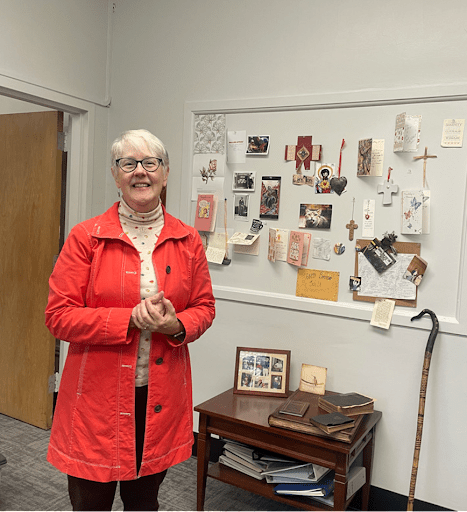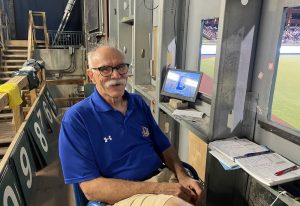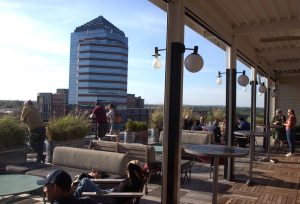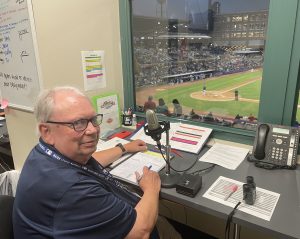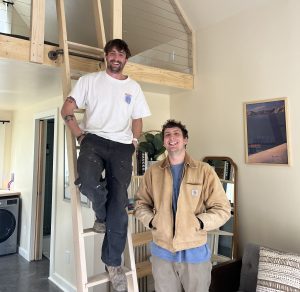In Atlanta, Georgia in 1980, an aspiring pastor was not someone you’d expect to find at a drag show.
But it was there that the Rev. Julia Webb-Bowden—then a college senior—revealed to her recently out gay friend that she was considering ordination in the United Methodist Church.
Her friend felt betrayed, she recalled. The church had added exclusive language to its Book of Discipline, declaring homosexuality incompatible with Christianity. But Webb-Bowden reassured him: She did not think the language would stand.
Forty-two years later, she stands in front of a cross at the pulpit, enveloped by arched wooden ceilings inside Elizabeth Street United Methodist Church in Durham.
Wearing a long white robe with gold accents and deep red lipstick, she preaches to some elderly and middle-aged churchgoers. It is the last Sunday of the Christian calendar, and the mood is somber.
“Woe to you who have scattered my flock,” she says with a slight Southern accent, referencing the Book of Jeremiah. Her voice does not bellow, but her message resonates: the Scripture implores us to be inclusive of all.
Next, she calls upon her congregation to pray for sick loved ones, expecting parents, and recent victims of a mass shooting at an LGBTQ nightclub in Colorado. Beneath the formalities of pastorship and clergy robes, her conviction remains.
“I have been fighting for inclusion from the very beginning,” she said in an interview. “I’m not new to this party.”
***
Out of the pulpit on a Wednesday afternoon, Webb-Bowden sports a pixie cut with a salmon-pink trench coat and cat-eye glasses. Her office is an amalgamation of things: a pin board full of letters from family and friends, crosses and the occasional photo of a cat; a bookshelf with a series of religious books; and a few plants around the room. Her days include planning sermons, studying Scripture and just talking to those who ask. She is married to a retired Methodist pastor, Larry Bowden, and a mother to four: two sons, Jacob and Charles, and two cats, Scamp and Mawzee. Her demeanor is unassuming, with a certain amount of spunk.
Webb-Bowden was not what I expected when I decided to visit a pastor. But when she got up mid-interview to retrieve her hymnal and share a favorite song, her enthusiasm for the gospel was indisputable. She has always been passionate about God, but, like her style, her path into ministry was unconventional.
‘A lot of chutzpah and moxie’
A self-described “cradle Methodist,” Webb-Bowden was born in Montgomery, Alabama in 1959. At 5 years old, she moved to Atlanta with her family during the height of the civil rights movement. She is the granddaughter of sharecroppers from the Ozark Mountains and the daughter of parents who lived through the Great Depression. Her parents raised her with a “progressive politic” and a deep sense that social inequities are wrong.
In some ways, it is obvious how her upbringing impacts her present work. For many years, she worked as the director of a faith-based nonprofit where she provided fresh produce to food- insecure communities in North Carolina. Now, at Elizabeth Street, she and her congregation distribute food to the neighborhood during the first Monday of every month. They host a community meal with strangers and friends and leave their garden open to any hungry passerby. The church also serves as a meeting ground for multiple nonprofits working to reduce violence and drug addiction in Durham.

She didn’t receive much encouragement, either. Her parents set low expectations, anticipating her to marry young or become a nurse. Nor were they very religious: Webb-Bowden described her father as “at best a Deist” who was grateful his daughter was too smart to be a “Jesus freak” like his crazy sister in Texas. That sister claimed to have visions of Jesus while changing her bedsheets, Webb-Bowden recalled.
Nevertheless, she began to think she might pursue ministry while at Huntingdon College in Montgomery, Alabama. She majored in religion and philosophy but was the only woman in the philosophy department. Again finding little inspiration, she decided to attend Duke Divinity School to figure out her calling.
While at Duke, Webb-Bowden served as a hospital chaplain for UNC Health, where she provided spiritual guidance to patients in labor and delivery. It was in the crucible of neonatology that Webb-Bowden emerged with a passion for pastoring. As a woman, she had never been invited into the worship setting to preach, but as a hospital chaplain working with patients in their most vulnerable state, she learned she had gifts for spiritual care.
If she could handle the emergency room, certainly she could manage a church. “I’m pretty fearless in relational aspects of ministry. And I have a lot of chutzpah and moxie,” Webb-Bowden said.
Just what they needed
After attending Duke Divinity School, working as a pastor in rural North Carolina and working at a nonprofit, Webb-Bowden came to Elizabeth Street in July 2021. Elizabeth Street had just been formed from the merging of two congregations: Resurrection United Methodist Church and Calvary United Methodist Church.
Buddy Dean, a 22-year-long member of Calvary and, subsequently, Elizabeth Street, said that she was exactly what the church needed at the time. Now good friends with Webb-Bowden, he praised her for her knowledge of the Methodist doctrine and stirring speeches, which are sometimes embellished with a couple of cuss words.
“I think that brings her more down to human level,” he said. “You know, I think she’s being herself. But she’s doing it in a Christian way.”
Unlike most other pastors, Dean said, Webb-Bowden participates in pretty much every activity going on at Elizabeth Street. She gave blood during the church’s blood drive, and she regularly participates in the community meals.
She is also a strong advocate of the congregation’s progressive Christian ideology. Calvary, which later became Elizabeth Street, claims to be the first reconciling congregation in North and South Carolina—in other words, the first Methodist church in the Carolinas to be inclusive of LGBTQ people.
That welcoming culture is felt by members of the church like Dean. Calvary was the first church where Dean and his husband were truly welcome, he remembers. At their previous church, they felt as if they could not show affection. But at Calvary, they could be themselves.
At Elizabeth Street, Webb-Bowden continues to foster an inclusive community. Amy Laura Hall, an associate professor of gender, sexuality, and feminist studies at Duke Divinity School and a member of the church, wrote in an email that Webb-Bowden made a good impression on her younger daughter and her daughter’s girlfriend.
They are “not terribly eager to attend church things,” Hall wrote, but Webb-Bowden impressed them. “Julia doesn’t talk down to people, but she does have a winsome, gritty wisdom about her.”
Not your ‘grandma’s Methodist church’
Not all congregations are so unified on the issue of welcoming LGBTQ people, though. In the fall of 2021, Pioneers Church, a previously Methodist church, opened a half-mile away from Elizabeth Street.
Webb-Bowden worked with local activists to campaign against the new church, which was criticized for its stances on LGBTQ issues, including reported opposition same-sex marriage. In response, Webb-Bowden wrote an impassioned article in favor of inclusion.
“We can’t think of a single instance when excluding people because of their sexuality, race, ethnicity, religion, or gender was a good idea,” she wrote.
Matthew Lardie, a queer activist in Durham, worked with Webb-Bowden to protest the nearby church. Lardie is not Christian and is skeptical of organized religion, he said. But he was struck by how friendly, open, and concerned Webb-Bowden was.
“This wasn’t a turf war for her,” he said. “She was immediately concerned about the harm that this could do for the community, not just the potential harm or public relations harm it might cause the Methodist Church.”
In June 2022, Pioneers disaffiliated from the Methodist church and joined the Wesleyan denomination because of community pushback. Webb-Bowden was proud of her congregation for their role in protesting that church.
“I hate what’s happened for the gay community on Geer Street,” she said. “And yet, it has mobilized and it’s helped Christian communities within this very gay community to be seen as something other than your grandma’s Methodist church.”
This ideological divide also extends beyond Durham. Every year, Webb-Bowden attends the annual gathering of the North Carolina Conference of The United Methodist Church, which exists to support Methodist churches around the eastern half of the state. But this year, 249 congregations, about 32% of the Conference, moved to disaffiliate from the Methodist denomination because of the church’s new stances allowing ordination of gay and lesbian clergy and permitting same-sex marriage.
It’s a “divorce,” Webb-Bowden said. “It is really painful…I’ve worked really hard to help my congregation understand the devastation that’s being felt by other congregations because it’s just a non-issue here.”
‘Welcome to our chaos!’
Although other churches are experiencing deep divides, Elizabeth Street remains united.
On a recent Sunday, the room buzzed with the excitement of old friends reuniting after a long time apart. Members wafted around the sanctuary sharing greetings and personal updates.
As a newcomer, I worried I’d interrupt their rituals. But any hesitation withered away as I was greeted like a welcome celebrity.
“Chloe, welcome to our chaos!” Webb-Bowden cheered from the lectern. Dean and someone named Barbara gave me a hug as others introduced themselves to me.
As Webb-Bowden began to speak, the crowd sat in captivation.
“She’s a very good preacher,” Dean said in an interview. “Her sermons are wonderful. Her knowledge of the Methodist rules and regulations, or the Methodist discipline, are just phenomenal.”
But she doesn’t give herself so much credit. “I would not say I’m a great preacher,” she said with a smile, lounging in her office rocking chair. “I limp into the pulpit.”
Above: The Rev. Julia Webb-Bowden in her office; sign in front of Elizabeth Street United Methodist Church. Photos by Chloe Nguyen — The 9th Street Journal

